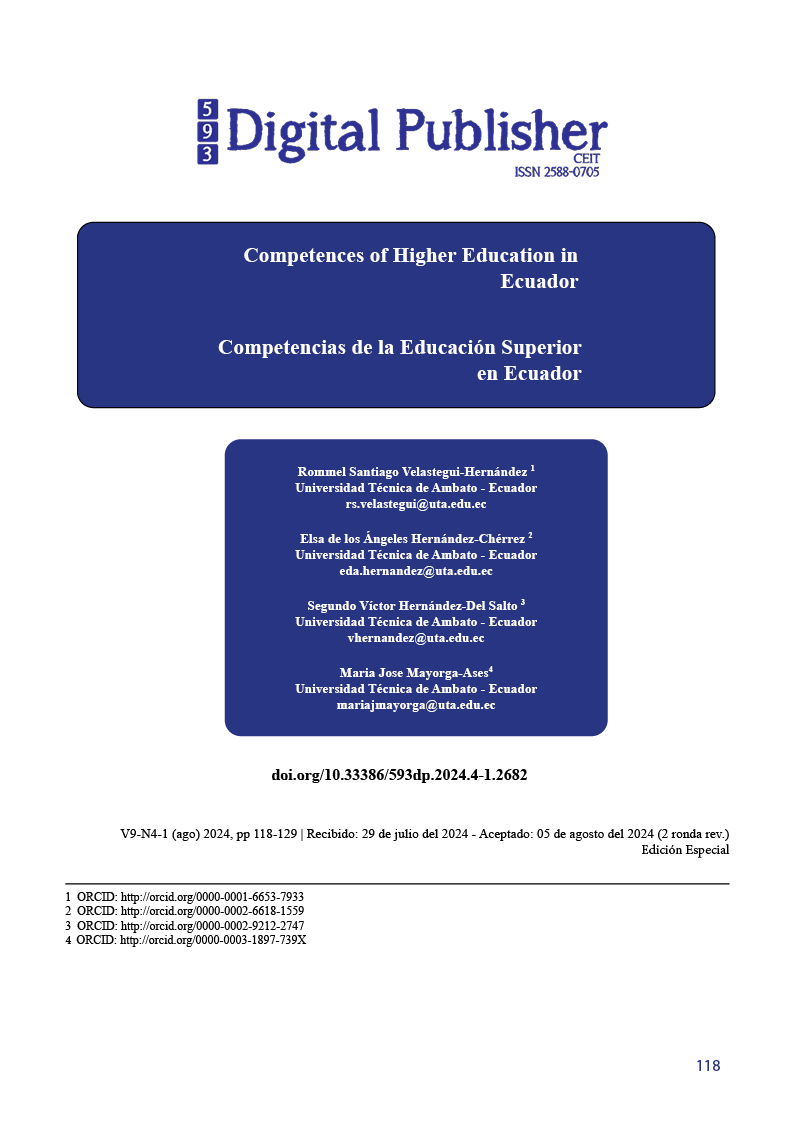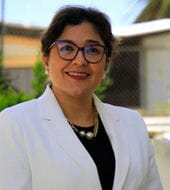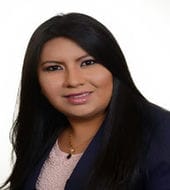Competences of Higher Education in Ecuador
Main Article Content
Abstract
The study on competences in Higher Education in Ecuador highlights both significant progress and challenges in skills formation. Generic skills, such as critical thinking, effective communication and teamwork, are widely valued, but their development varies between institutions. Some universities have adopted innovative methodologies, such as project-based learning, while others still use traditional methods, affecting educational equity and quality. In terms of specific skills, technical and technological universities are better aligned with the needs of the labour market, integrating professional practices and emerging technologies. In contrast, traditional universities, especially in social sciences and humanities, face challenges in updating their curricula and offering practical experiences, highlighting the need for reforms to better prepare graduates for the labour market. Teaching and assessment methodologies also present challenges. Although active methodologies such as problem-based learning are effective, their implementation is not uniform, and many institutions continue to use traditional methods that limit the practical application of knowledge. Assessments focused on theoretical knowledge do not adequately capture practical and transversal skills. Education policies have established important guidelines, but their implementation faces problems such as lack of resources and administrative rigidity. The gap between theory and practice, the rapid technological evolution and the need for collaboration with the productive sector require continuous attention to improve higher education in Ecuador.
Downloads
Article Details

This work is licensed under a Creative Commons Attribution-NonCommercial-ShareAlike 4.0 International License.
1. Derechos de autor
Las obras que se publican en 593 Digital Publisher CEIT están sujetas a los siguientes términos:
1.1. 593 Digital Publisher CEIT, conserva los derechos patrimoniales (copyright) de las obras publicadas, favorece y permite la reutilización de las mismas bajo la licencia Licencia Creative Commons 4.0 de Reconocimiento-NoComercial-CompartirIgual 4.0, por lo cual se pueden copiar, usar, difundir, transmitir y exponer públicamente, siempre que:
1.1.a. Se cite la autoría y fuente original de su publicación (revista, editorial, URL).
1.1.b. No se usen para fines comerciales u onerosos.
1.1.c. Se mencione la existencia y especificaciones de esta licencia de uso.
References
Aguirre, P., Villota, F. H., & Mera, S. (2023). Sustainability in higher education in Ecuador- Universidad Técnica del Norte case study. International Journal of Sustainability in Higher Education, 24(5), 1136–1160. https://doi.org/10.1108/IJSHE-07-2021-0268/FULL/PDF
Alvarado, P. R., & Malbarez, M. C. R. (2023). Auditoría de género: Un enfoque desde la responsabilidad social universitaria. Revista de Ciencias Sociales, 29(3), 219–235. https://doi.org/10.31876/RCS.V29I3.40713
Arteaga-Briones, L. A., Azúa-Arteaga, A. A., & López-Padrón, A. (2023). Modelo para seguimiento de graduados: Hacia el aseguramiento de la calidad de la Educación Superior ecuatoriana. Revista de Ciencias Sociales, 29(3), 264–279. https://doi.org/10.31876/RCS.V29I3.40711
Clavijo Castillo, R. G., & Bautista-Cerro, M. J. (2020). Inclusive education. Analysis and reflections in Ecuadorian Higher Education. ALTERIDAD.Revista de Educación, 15(1), 113–124. https://doi.org/10.17163/ALT.V15N1.2020.09
Ely, M., Magíster, B. /, & Ferruzola, E. (2015). Los Sistemas de información gerencial: aplicabilidad en procesos empresariales y de educación superior en el Ecuador. SATHIRI, 8, 136–149. https://doi.org/10.32645/13906925.402
Espinosa, B., María Goetschel, A., & Carrasco, F. (2022). Dreams of a Globalized University in Ecuador: The Reforms of the Rafael Correa Government. Https://Doi.Org/10.1177/0094582X221084302, 49(3), 31–48. https://doi.org/10.1177/0094582X221084302
Guacho, G. K. B., Vallejo, P. X. M., & Sanaguano, M. E. V. (2021). Predicción del nivel de riesgo de reprobación estudiantes de educación superior usando un modelo de red neuronal artificial. ConcienciaDigital, 4(3.1), 95–104. https://doi.org/10.33262/concienciadigital.v4i3.1.1816
Guerrero, L. K. S., Sandoval, J. A. D., & Álvarez, J. M. G. (2022). Bases pedagógicas en la formación del docente de Educación Superior Técnico-Tecnológica en el Ecuador. Revista Conecta Libertad ISSN 2661-6904, 6(3), 14–28. https://revistaitsl.itslibertad.edu.ec/index.php/ITSL/article/view/307/485
Jameson, K. P. (1997). Higher education in a vacuum: Stress and reform in Ecuador. Higher Education, 33(3), 265–281. https://doi.org/10.1023/A:1002992020931/METRICS
Jameson, K. P. (1999). Moving ‘social reform’ to center stage: Lessons from higher education in Ecuador. Higher Education Policy, 12(2), 123–140. https://doi.org/10.1016/S0952-8733(99)00003-3/METRICS
Javier, P., Guamán, S., Pastora, M., Sánchez, G., Virginia, ;, Suarez Guamán, J., & Pastora, K. (2017). La educación superior en el Ecuador Vs Las nuevas tecnologías. RECIMUNDO, 1(5), 484–496. https://doi.org/10.26820/RECIMUNDO/1.5.2017.484-496
Johnson, M. A. (2017). Contemporary Higher Education Reform in Ecuador: Implications for Faculty Recruitment, Hiring, and Retention. Education Policy Analysis Archives, 25(68). https://doi.org/10.14507/epaa.25.2794
Loaiza, M., Loaiza, M., Abarca, P. A., & Salazar, ngela del C. (2017). Determination of the Innovative Capacity of Ecuadorian Universities. Journal of New Approaches in Educational Research (NAER Journal), 6(1), 57–63.
Mendoza, M. L., Ortega Santos, J. P., & Llerena Gavilánez, C. A. (2014). Strategic alliances in higher education in Ecuador: the challenge of knowledge transfer and its effect on the learning curve. Suma de Negocios, 5(12), 96–104. https://doi.org/10.1016/S2215-910X(14)70031-X
Orellana, V., Cevallos, Y., Tello-Oquendo, L., Inca, D., Palacios, C., & Renteria, L. (2019). Quality evaluation processes and its impulse to digital transformation in ecuadorian universities. 2019 6th International Conference on EDemocracy and EGovernment, ICEDEG 2019, 338–343. https://doi.org/10.1109/ICEDEG.2019.8734373
Pacheco, J. A. B., Teijeiro-álvarez, M. M., & García-álvarez, M. T. (2020). Sustainable Development in the Economic, Environmental, and Social Fields of Ecuadorian Universities. Sustainability 2020, Vol. 12, Page 7384, 12(18), 7384. https://doi.org/10.3390/SU12187384
Pedrera, C. J. (2014). La gestión universitaria basada en el clima organizacional utilizando principios del modelo de la endocalidad. Sur Academia: Revista Académica-Investigativa de La Facultad Jurídica, Social y Administrativa, 1(2). https://revistas.unl.edu.ec/index.php/suracademia/article/view/21
Post, D. (2011). Constitutional Reform and the Opportunity for Higher Education Access in Ecuador Since 1950. Education Policy Analysis Archives, 19(0), 20. https://doi.org/10.14507/epaa.v19n20.2011
Saavedra, F. M. (2012). Higher Education Reform in Ecuador and Its Effect on University Governance. International and Development Education, 161–175. https://doi.org/10.1057/9781137040107_11
Sánchez, T., Gilar-Corbi, R., Castejón, J. L., Vidal, J., & León, J. (2020). Students’ Evaluation of Teaching and Their Academic Achievement in a Higher Education Institution of Ecuador. Frontiers in Psychology, 11, 509559. https://doi.org/10.3389/FPSYG.2020.00233/BIBTEX
Serrano de Moreno, M. S., Castellanos Herrera, S. J., & Andrade, D. J. (2024). Competencias en investigación del profesorado universitario: Desafíos en la construcción de la cultura investigativa. Revista de Ciencias Sociales, 30(1), 381–397. https://doi.org/10.31876/RCS.V30I1.41662
Torres-Diaz, J., Torres-Diaz, J., & Duart, J. (2015). Determinants of digital inequality in universities: the case of Ecuador. Journal of E-Learning and Knowledge Society, 11(3).
Trujillo, S. (2023). Educación Superior, pilar fundamental en el desarrollo integral del Ecuador. Educación, Arte, Comunicación: Revista Académica e Investigativa, 2(1). https://revistas.unl.edu.ec/index.php/eac/article/view/1997
Velastegui, R., Poler, R., & Díaz-Madroñero, M. (2023). Aplicación de algoritmos de aprendizaje automático a sistemas robóticos multiagente para la programación y control de operaciones productivas y logísticas: una revisión de la literatura reciente. Dirección y Organización, 0(80), 60–70. https://doi.org/10.37610/DYO.V0I80.643
Velastegui, R., Poler, R., & Diaz-Madroñero, M. (2023). Conceptual model for scheduling and control of production and logistics operations using multi-agent robotic systems and blockchain. DYNA, 98(3), 307–313. https://doi.org/10.6036/10724





